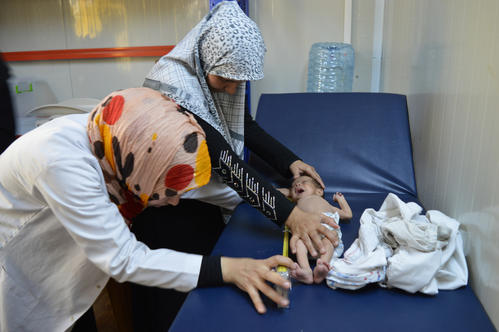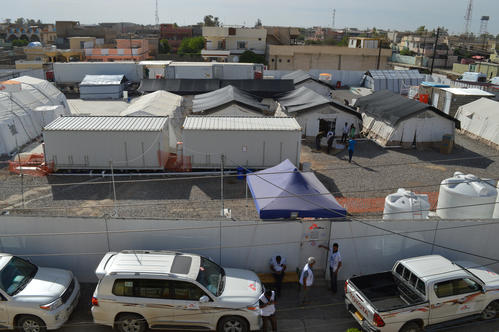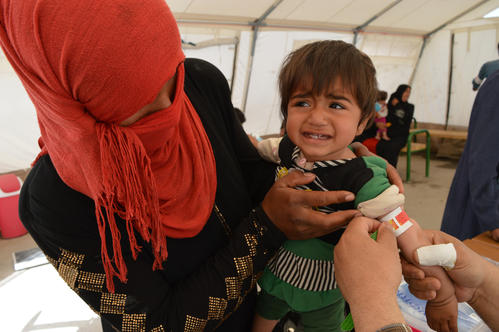Northern Iraq
West Mosul
MSF has started to provide life-saving trauma assistance for the war-wounded at a medical structure in the Old City of west Mosul, the final conflict area, where an estimated 60,000 residents remain.
Teams are carrying out surgery for war-wounded patients, performing emergency caesarean sections, and providing short-term post-operative care and maternity care. The facility in Mosul, the second largest city in Iraq, is equipped with an emergency room and a mass casualty intake room for triage in case of an influx of wounded patients.
Emergency and Post Operative Care, Al Taheel
At Al Taheel hospital, where MSF opened a 24/7 emergency room on 26 March, a surgical unit and 32-bed post-operative ward have been set up to provide medium-term care to patients in and around Mosul suffering from violent trauma injuries.
The emergency room has received more than 1,000 patients since it opened and more than 175 surgical interventions have been carried out.
Al-Khansaa Teaching Hospital, East Mosul
MSF has just started supporting this Ministry of Health facility in the Al-Sukkar neighbourhood, which has suffered extensive damage during the conflict. The hospital currently has a 120-bed capacity to respond to the massive needs in Mosul. Mental health support is to be provided to all patients.
Maternal Health, Karama
MSF opened a 15-bed maternity hospital in Karama, east Mosul on 19 March. The team, composed of international and Iraqi midwives and obstetricians, has assisted 376 births at the hospital, which is open 24/7.
Trauma care and primary healthcare, Hammam al-Alil
Hammam al-Alil (known as HAA) is located 30 kilometres south of Mosul and is the closest camp for internally displaced people. The town has received a big influx of displaced people, with more arriving daily to be settled in different camps and with many in transit as they return to east Mosul.
MSF opened a field trauma hospital in HAA on 16 February. It is equipped with a 22-bed emergency room, two operating theatres, a seven-bed intensive care unit/recovery room and a 32-bed inpatient department. Between 19 February and 10 June, the emergency room received 3,144 patients, 56 per cent of whom were women and children. To date, the team has performed 305 major surgical procedures and 67 minor procedures. The majority of cases are emergency surgeries.
Since April 15, MSF has also supported the local department of health’s primary healthcare centre in Hamman Al-Alil town. More than 18,000 consultations for the host population and the internally displaced were carried out by 10 June.
MSF has run an ambulatory therapeutic feeding centre for children suffering from acute malnutrition since June. The majority of patients come from two nearby camps for internationally displaced people. Psychosocial support is offered to the patients in the trauma centre and primary healthcare centre.
Post-operative and rehabilitation care, Al Hamdaniya
At Al Hamdaniya hospital, MSF has provided post-operative care with rehabilitation and psychosocial support in collaboration with Handicap International since 15 March. Of the 255 patients admitted to date, nearly half have been women and children, and the 43-bed facility is almost constantly full. A room for advanced dressings, where minor surgical procedures can be performed, is expected to open in the next few days.

Qayyarah
An emergency room and operating theatre have been added to the hospital MSF opened in December 2016 in Qayyarah, 60 kilometres south of Mosul. The number of beds has been increased from 32 to 46 to better cater for the growing and diversifying needs.
By 1 June, the team had treated 7,100 patients in the emergency room, around 10 per cent of whom were admitted to the inpatient department. A total of 1,350 surgical interventions were performed between December and 1 June. A four-bed intermediate care unit, opened in mid-April to provide care to patients in critical condition, has been equipped with seven observational beds and two resuscitation beds.
MSF set up a 12-bed intensive therapeutic feeding centre in March to provide care to children recently displaced from west Mosul or Shirqat Region, as well as those from camps for displaced people in Hammam al-Alil and Qayyarah. In May, 178 patients were admitted, including 91 infants under six months old. The centre works regularly over capacity, with as many as three babies per bed. Since February, MSF has run a mental health clinic for patients in the hospital and those referred from Qayyarah camps. The team consists of a psychiatrist, two psychologists and two psychosocial counsellors.
Camps for internally displaced people
The population of four camps for displaced people from Mosul sharply increased to 80,000 by the end of March following the mid-February offensive in west Mosul. Some 10,000 people have since left the camps to stay with relatives or rent houses in retaken areas of east Mosul.
In Chamakor and M2 camps, MSF mobile teams are offering treatment for chronic diseases (mainly diabetes and hypertension).
An MSF team is providing psychological and psychiatric consultations, group therapy, psychosocial counselling and child therapy to people suffering from moderate to severe mental health conditions.
Since the beginning of 2017, MSF teams providing mental healthcare in 13 sites have carried out more than 19,400 medical consultations and 12,200 mental health consultations in the camps near Mosul.
Elsewhere in Iraq
MSF teams are also working in Kirkuk, Dohuk, Sulaymaniyah, Salah Al-Din, Diyala, Al-Anbar, Baghdad and Babylon governorates.
Kirkuk governorate
Teams are providing medical and mental health services to people displaced from Hawija. MSF runs a non-communicable diseases clinic and mental health activities, including referrals for psychiatric care in Daquq camp for displaced people. At Maktab Khalid entry point and Debes screening site, MSF’s medical and humanitarian presence through the provision of mobile clinics ensures that the people with the greatest health needs fleeing Hawija receive timely treatment. MSF also supports the emergency rooms of the two main Kirkuk hospitals with training for Department of Health doctors and nurses in emergency room-related skills, donations of crash carts, and trauma room reorganisation.
Zummar
Staff at the MSF-run maternity clinic in the village of Tal Maraq have assisted more than 500 safe deliveries since the start of the project in November 2016. The clinic offers pre- and post-natal consultations, basic emergency obstetric and neonatal care, manages minor obstetric complications, and refers patients with more serious obstetric complications to hospitals in Zakho and Dohuk. Since February, the clinic has a small paediatric ward.
MSF teams run mobile clinics in surrounding villages offering general healthcare and mental health consultations, as well as follow up and treatment for patients with non-communicable diseases.
Dohuk governorate
In the Domiz refugee camp for Syrian refugees, MSF is running a maternity unit where women can deliver their babies safely and access reproductive healthcare. Since January 2016, MSF teams have assisted more than 1,000 births.
Sulaymaniyah Governorate
MSF works with the health authorities in Sulaymaniyah emergency hospital and provides hands-on training to improve the quality of medical services in the intensive care unit and emergency trauma ward. The rehabilitation of the emergency room and intensive care unit wards has improved layouts and patient flows. Since the start of the project, staff have seen more than 200,000 patients in the emergency room and over 500 in the intensive care unit.
MSF has worked in camps for internally displaced people in the governorate since 2015, conducting health promotion activities and providing psychological and psychosocial care.
Salah Al-Din governorate
As military operations expand in northwestern Iraq, thousands of Iraqis continue to flock to relatively safer areas. Since June 2016, MSF’s mobile clinics have offered outpatient and mental health consultations in the city of Tikrit and the surrounding areas. In January 2017 MSF established a primary healthcare centre in one of the camps.
Diyala governorate
Since May 2016, approximately 100,000 displaced people have returned to the towns of Sadiya and Jalawla, which were retaken from the Islamic State group. MSF supports the primary healthcare clinics in Sadiya and Jalawla, focusing on chronic diseases, sexual and reproductive health, maternity, mental health and health promotion services for displaced people, returnees and the host community.

Al-Anbar Governorate
In June 2016, MSF started running mobile clinics in the Amariyat Fallujah, Habbaniyah, Khaldiya and Ramadi (Kilo 18), to assist people forced to flee the areas of Fallujah and Ramadi in Al-Anbar governorate. A healthcare centre established in the camp in Amariyat offers primary healthcare consultations, emergency care, inpatient care, mental health care, as well as stabilisation and referral services to the camp’s population of around 60,000.
Baghdad Governorate
MSF teams in Abu Ghraib provide medical and mental health services to people displaced from central Iraq. A mobile medical team operates in impoverished neighbourhoods in the Abu Ghraib district, where many displaced people have settled in the past two years. A second team, based in a primary healthcare clinic in the Al Shuhada II area, is assessing the needs of thousands of people who were displaced and are now returning to their homes in villages in northern Abu Ghraib and Karma district in Anbar. In 2017, MSF has so far provided over 12,700 consultations, more than 2,300 consultations for non-communicable diseases and over 450 mental health consultations.
Babylon Governorate
Since spring 2017, MSF has been fully supporting the 60-bed Ibn Saif Paediatric Hospital in Musayib. The team will concentrate on capacity-building, training and logistics support. Psychosocial services are to be supported at the hospital and within the community.



